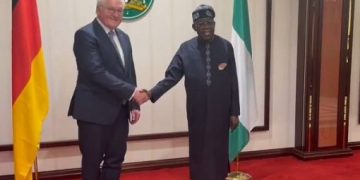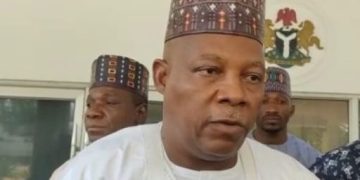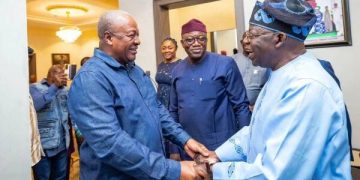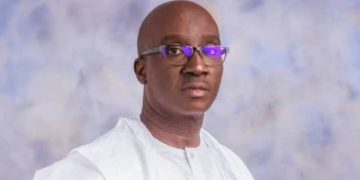The meeting between the Federal Government and the Nigeria Labour Congress (NLC) yesterday ended in deadlock with both parties agreeing to continue talks over post-subsidy removal palliatives for workers.
The talks will continue before the 21-day ultimatum issued by the NLC as both parties pledged to find solutions to key demands tabled before the government by the Organised Labour before the deadline.
Speaking after the meeting convened by the Minister of Labour and Employment, Simon Lalong, and the Minister of State, Nkeiruka Onyejecha, at the ministry’s headquarters, Abuja, the NLC President, Comrade Joe Ajaero, said it is only the presidency that can take decisions on the demands presented to the government.
The labour leader described the meeting as “fruitful.”
Ajaero said labour was ready to meet the government any time of the day to find solutions to its demands and avert the planned strike.
Some of the demands of the NLC and the Trade Union Congress included: wage awards, tax exemptions and allowances to public sector workers, provision of Compressed Natural Gas buses, release of modalities for the N70bn for Small and Medium Enterprises, release of officials of the National Union of Road Transport Workers by the police, Road Transport Employers Association of Nigeria crisis in Lagos, among others.
Lalong said many of the items presented by Labour were still under consideration before the final agreement.
READ ALSO: I get bullied by same people mourning Mohbad — Yul Edochie
The NLC president said, “Like the minister said we had a fruitful deliberation and we have agreed to continue to make sure we arrive at a meaningful agreement within the remaining days of the ultimatum.
“We equally discussed frankly the issue bordering the coup floated and executed by the Nigeria Police against the National Union of Road Transport Workers which has led to the detention of their democratically elected national officers and both parties agreed to show concern towards the resolution of the matter.
“It is one sore area that the trade union movement in Nigeria is not ready to compromise. Whether a coup in the trade union movement or the polity. It must be condemned; whether it is in Niger Republic, Congo, Mali, or the trade union movement in Nigeria.
“On the other issue, you can see that there is no agreement or implementation on any. There is no CNG anywhere. Refineries are not working. No agreement on wage awards. Those are the issues we believe that something will happen before the ultimatum expires. Something may happen.
“We had a convivial deliberation with the minister and we hope that even if it is remaining one day we will get to the root of all these problems. Whenever we are invited we will be there. Both parties will work towards the realisation of these objectives before the last minute of the ultimatum.
“There is a larger committee that has set up technical committees. The ministry has performed its role to mediate and conciliate the problem between us and the Federal Government. There is an inter-ministerial committee at the presidency level that is supposed to address these issues.
“The Ministry of Labour can’t address wage awards, the issue of CNG, refineries and others. The ministry has mediated to ensure that there is no problem or get both parties to resolve these issues.
“We are ready to engage the government whether in the night or day; we are ready to engage but not at gunpoint.”
Before the meeting went into a closed-door session, Ajaero said the two-day warning strike declared on September 5 and 6 by the NLC was a “product of frustration caused by the economic situation in the country.”
The President of NLC said, “None of the demands put before the Federal Government had been addressed.”
He lamented the lack of trust between the government and the union in the negotiation process.
Ajaero said, “We came with mixed feelings about whether it will work or not because we have had many meetings, some beyond this level, yet nothing seems to be coming out of it. But I have great optimism in the Nigerian project; we can’t stop trying. We are here with the belief that something may happen. But that doubt, that trust gap is what we feared for a long time now and it calls for lamentation.
“The strike is an effect of a policy that doesn’t have a human face. There was no strike before the removal of the fuel subsidy. It was the government that said ask for palliatives, ask for wages and we have asked for it. That warning strike was a product of frustration, up till this moment.
“We must work together to ensure that we don’t keep on dragging these issues. It is the Nigerian people that are being affected, they are the people that are suffering. We have a lot of demands that we have put on paper for the government. There is the issue of CNG, refineries working, wage awards, and cash transfers. Of all these agreements, not even one has been addressed by the government and you want us to meet every day.
“Some of us have been around for a long time and our job is not to go on strike but when you enter into an agreement that agreement should be implemented. Before the warning strike, we raised the issues of palliatives and wage awards and the NURTW.
“Nobody earning N30, 000 or N60, 000 will buy fuel for one week. We need to find solutions to all these problems and we have articulated them. Each time we finish they ask for time. They asked for eight weeks we gave them. They asked for four weeks we gave them. We don’t know what to tell our colleagues or members again. We hope that at the end of this meeting, we will have something to tell our members. This is a neck-breaking meeting.”
















